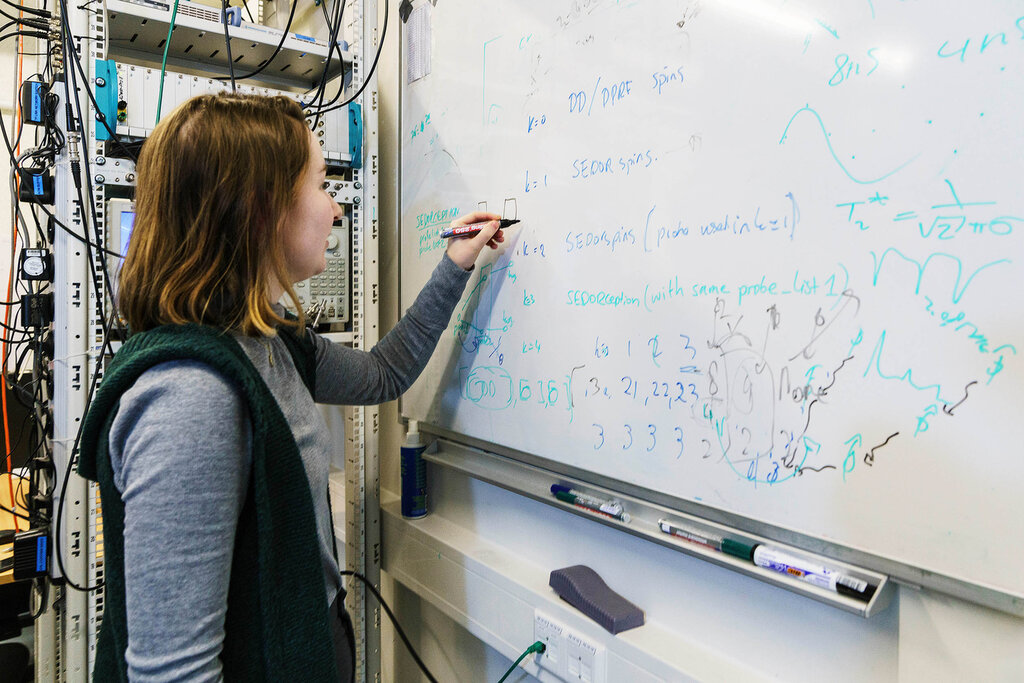Innovation &
collaboration
Science to impact
Building on our outstanding research, QuTech’s economic impact in the Netherlands, and particularly in Delft, is becoming increasingly visible. It is not only evident from our research collaborations with globally operating technology giants but also from our rapidly expanding ecosystem of quantum companies. This ecosystem encompasses start-ups and scale-ups in quantum computing and quantum networking, as well as international companies that join the House of Quantum to establish a Dutch or European presence in proximity to the quantum talent that is concentrated in Delft.
The companies within the Delft ecosystem are transforming laboratory discoveries into tangible real-world applications, extending the quantum domain to involve an increasing number of people and disciplines. As the ecosystem has expanded, these enterprises and our collaborative research have become an integral part of our joint efforts to advance quantum technology. We can safely say that we are building the quantum future together.
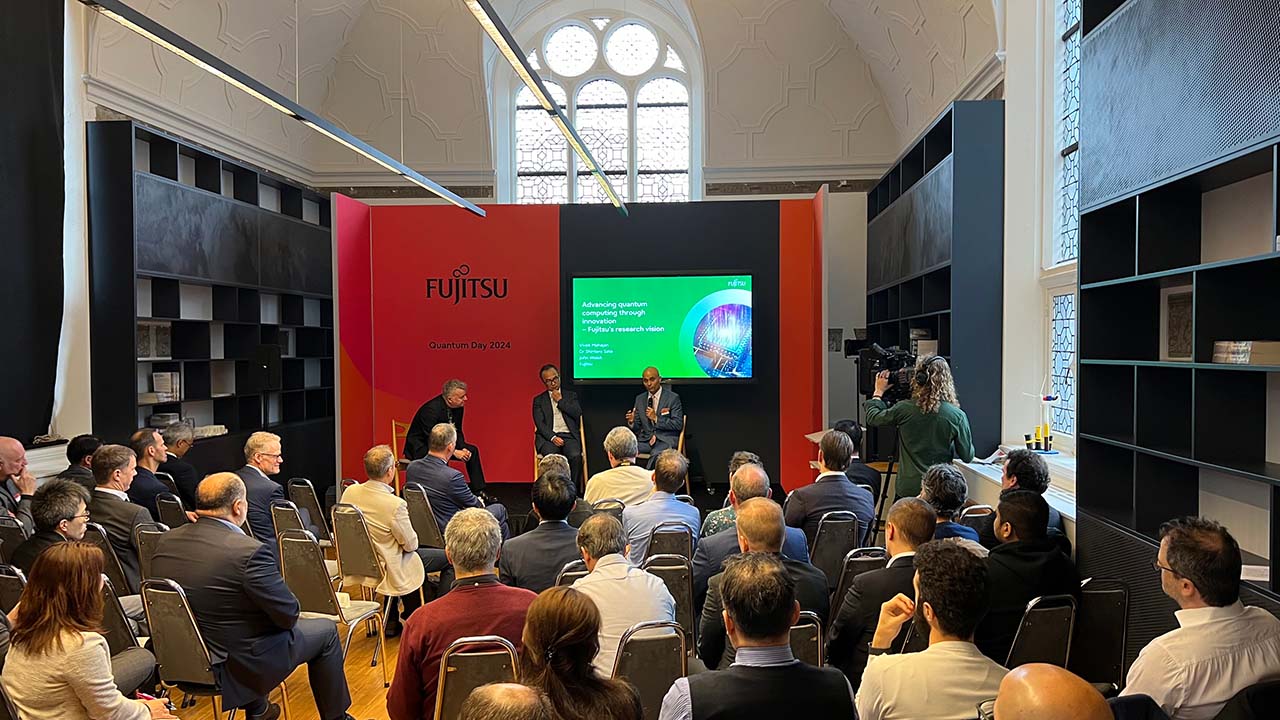
Partnerships to accelerate development
Highlights
With our quantum computing demonstrator Quantum Inspire, QuTech is participating in the Quantum Application Labconsortium, helping organisations understand the capabilities and limitations of quantum computing technologies for optimisation, simulation, machine learning, and more.
February saw the launch of the IGNITE consortium, a multidisciplinary team of European experts from academia and industry, working to advance the development of scalable and fault-tolerant quantum computers by leveraging semiconductor technology and germanium qubits. QuTech is proud to serve as the project’s coordinator, with Menno Veldhorst acting as Principal Investigator.
Also in February, Fraunhofer ILT and QuTech took the next step in their close partnership to progress European innovation in quantum communication and information networks. As part of a joint mission to develop and deploy a multinational quantum network in the EU, QuTech will provide Fraunhofer ILT with a fully functional quantum internet node for the installation of a first German quantum link.
And in the same month, researchers, and engineers from QuTech and Eindhoven University of Technology created Majorana particles and measured their properties with high level of control, publishing their results in Nature.
May saw the start of the QCINed project, the Dutch part of EuroQCI, which will be a secure quantum communication infrastructure spanning the whole EU. In three locations in the Netherlands, the Ministries of Justice and Security, Foreign Affairs and Defense, Eindhoven University of Technology, Quantum Delta NL, Q*Bird, SURF, RINIS and QuTech are working together on Quantum Key Distribution networks and testbeds, large parts of which use the QKD technology developed at QuTech and supplied by Delft spin-out Q*Bird.
In the QUADRATURE consortium, launched in June, QuTech and renowned institutes like the École Polytechnique Fédérale de Lausanne and the universities of Catalunya, Valencia, Dublin, Catania, and Siegen, are researching how to develop a scalable quantum computer by connecting multiple individual quantum processors through coherent quantum communication links and cryo-CMOS wireless classical links.
In July, Intel and QuTech formally agreed to extend their successful alliance long-term. Having worked together on quantum research since 2015, and achieving ground-breaking achievements, both parties decided to continue their collaboration beyond 2025.
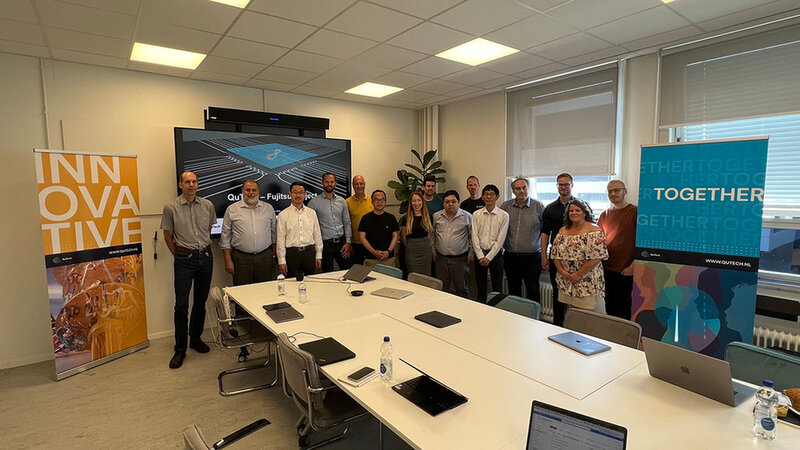
In September, Fujitsu, apart from granting QuTech an expansion of the budget and scope of their collaboration, signed a framework agreement with TU Delft to start a long-term collaboration in the field of Quantum Technologies and Quantum High-Performance Computing (QHPC), including applications.
In November, QuTech and the Danish NNF Quantum Computing Programme (NQCP) formalized their collaboration in a partnership agreement. The partnership is centered around the development of silicon-germanium epitaxial heterostructures for quantum processor chips. These materials pave the way for the operation of high-performance quantum processors.
November also saw the launch of QuKiT. The project, funded by an EIC Pathfinder grant, aims to develop a novel hybrid qubit: the Kitmon, which is a hybrid system composed of a superconducting qubit integrated with a topologically protected Kitaev chain. The consortium is led by QuTech, with partners at the IOM Materials Foundry at the National Research Council of Italy, the Institute of Science and Technology Austria (ISTA), Energiatudomanyi Kutatokozpont, the Spanish National Research Council, the University of Augsburg, and Orange Quantum Systems.
At Qblox’s 5th anniversary celebration, in December, QuTech’s Research Director Lieven Vandersypen and Qblox's COO Eric Kievit signed an agreement to kick off the QuTech-Qblox Quantum Excellence Center partnership, which aims to foster more collaboration and growth in the quantum sphere.
With the latest and final scientific data being collected, December also marked the close of the QLINK project. This collaboration between KPN, SURF, OPNT,Fraunhofer,and QuTech aimed to make significant progress in building the first quantum link connecting the Randstad, by entangling remote quantum processors over a significant distance of 10km, while using deployed optical fiber. The results will be published in 2024.
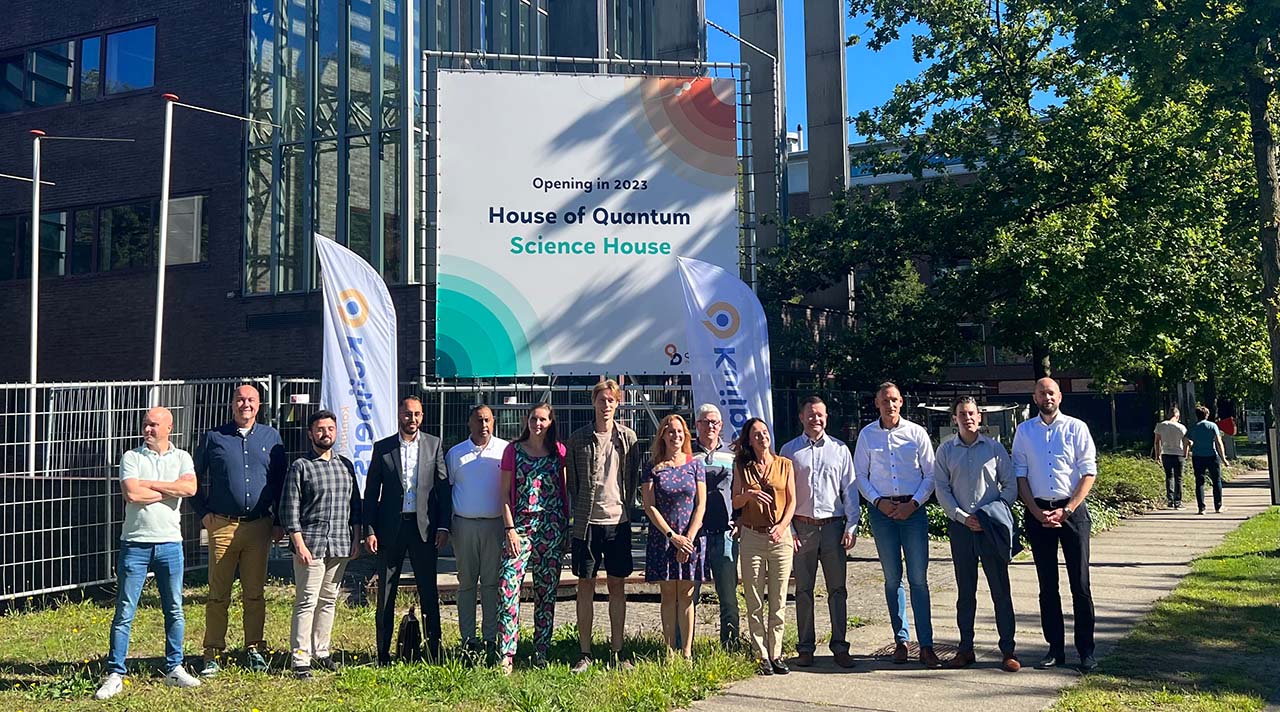
QuTech entrepreneurs: spin-offs, spin-outs and patents
Highlights
In 2023 QuTech, i.e., TU Delft and TNO together, filed 26 patent applications in key areas of potential impact, doubling the annual numbers of previous years.
In March, QuantWare, the leading provider of large-scale superconducting quantum processors, announced a €6 million Seed Round led by Forward.One, with QDNL Participations and Graduate Entrepreneur also playing significant roles.
Also in March, Q*Bird and Single Quantum announced that they, together with a consortium of quantum tech companies, will develop next-generation industrial quantum cryptography devices within a €5 million EU-funded project called MDI-QUEEN.
In June, Orange Quantum Systems obtained an EIC Accelerator grant to deliver diagnostics systems for the quantum industry and in September they raised another €1.5 million pre-seed in a round co-led by QDNL Participations and Cottonwood Technology Fund.
May saw the launch of HectoQubit/2. In this project, which is funded by Quantum Delta NL under its Cat-1 program and coordinated by QuTech, four companies in the Delft ecosystem - Orange Quantum Systems, QuantWare, Qblox, and Delft Circuits - are building a full superconducting quantum computing system, which will be connected to the cloud by TNO. The DiCarlo lab at TU Delft will be responsible for integrating all the companies’ and TNO’s contributions and making the new quantum computer publicly available through the Quantum Inspire cloud platform.
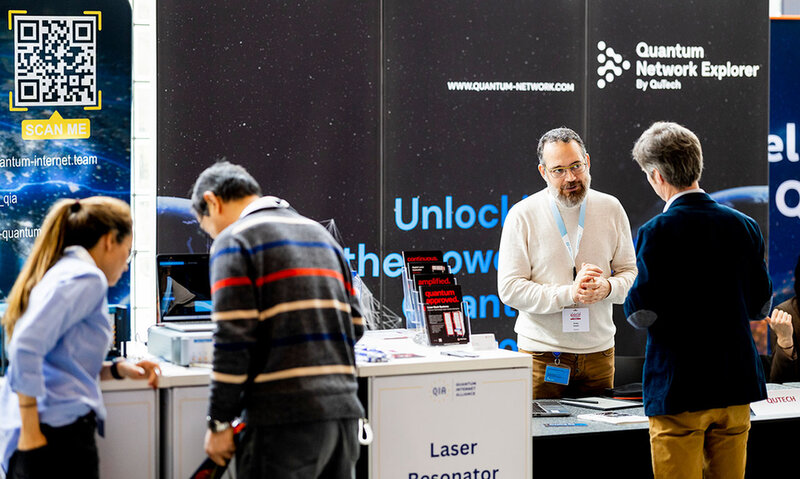
In July, SemiQon and Qblox together secured €2.5 million in EIC Transition funding. The goal of their project is to build high-quality silicon-based spin-qubits and the tools to control and operate them sustainably, using a scalable quantum computing control stack.
Also in July, QuantWare delivered the first of three quantum processors to Barcelona's renowned Quantum Computing Technology laboratory at the Institut de Fisica d'Altes Energies, where it’s running in a Qilimanjaro facility. The project will allow the Spanish academic and business community to first execute quantum circuits under full Spanish control.
In August, together with current investors, DeepTechXLannounced a Series A investment of €6.3 million in Delft Circuits, of which DeepTechXL contributes €5 million for upgrading and further upscaling of the production capacity and organization of Delft Circuits.
September marked the start of the final building phase of Delft Science House, the second House of Quantum building in Delft. Covering 2,500 m² of office and technical lab spaces, the facility will offer eight "plug-and-play" quantum fridge points, a private fiber-optic connection between the Science House and Elektronicaweg 10, and several other amenities. These resources will be available to the Delft quantum ecosystem from early 2024, when House of Quantum will also be welcoming companies from outside of the Netherlands.
In October, Deloitte named Qblox the fastest-growing high-tech hardware company in the Netherlands.
In December, QuTech spin-off Q*Bird delivered the first section - two end users connected through a central hub - of a new type of secure, cost-effective, and scalable quantum network at Port of Rotterdam. It was the world’s first QKD-system connecting multiple commercial users and will ensure an untappable internet connection between many users, spread out throughout the harbour area.
Also in December, QuantWare and NVIDIA announced that the first deployment of NVIDIA’s #DGXQuantum technology will be powered by a QuantWare quantum processor.
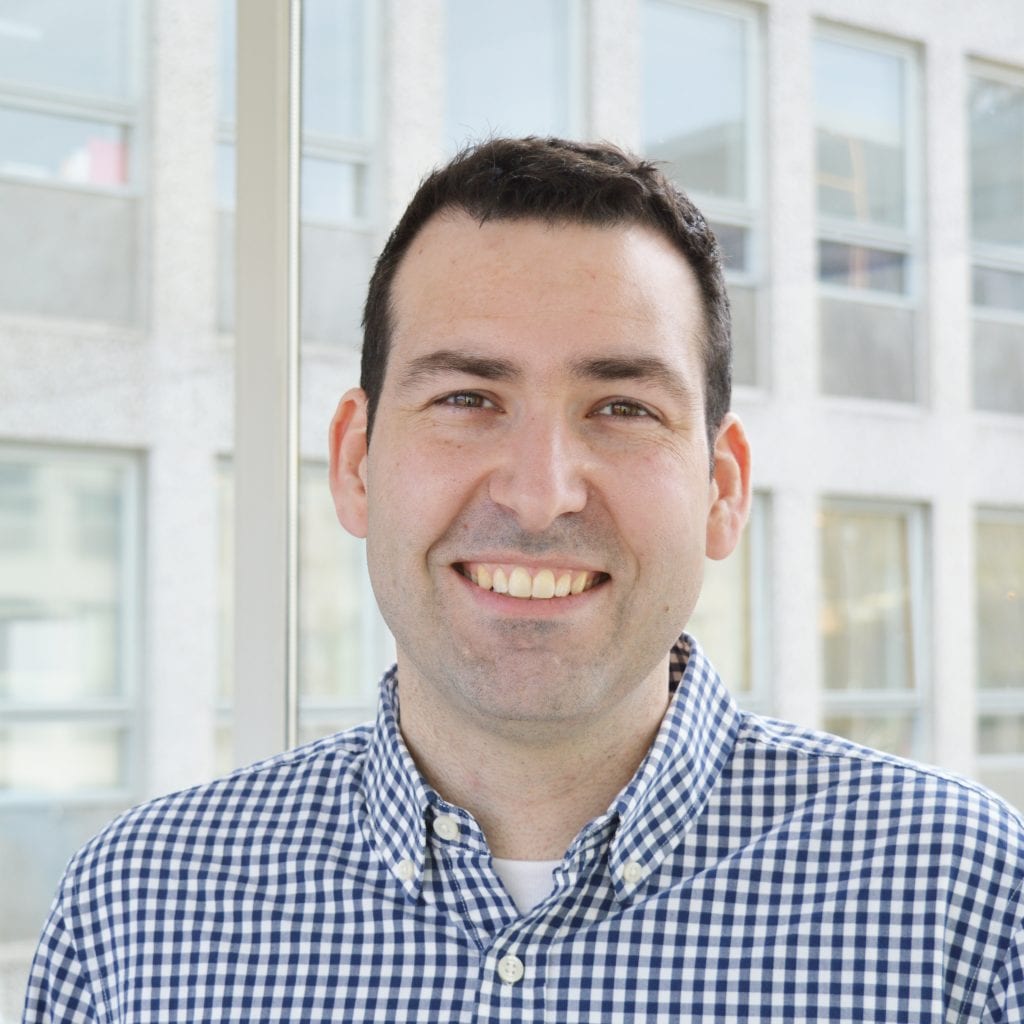
Joshua Slater, Q*Bird
“There's just so much that could be built and achieved, and I want to be a part of it.”
“The formal founding of Q*Bird at the beginning of 2022 was one of the big highlights of the year. Something that was three years in the making. Another big one was when we ‘graduated’ from being an internal part of QuTech to becoming a standalone entity later in the year. A third highlight was when the first real funding came in. Of course, money is great, but what felt really good was that we finally got that external validation. It was really like: “Wow, someone trusts us.”
I think the big benefit of QuTech was that it provided us with a safe, well supported environment. Being able to lay a foundation, shape our ideas and refine our plans for Q*Bird, was invaluable. Also, the QuTech brand brings a lot of value. It helped open doors and start early conversations with potential partners and customers.
I find the things we're doing truly interesting and fun. I really think we can build fantastic devices that people might want and enjoy. It’s exciting to see the potential of a communication web covering the Netherlands and extending into other countries using our equipment. There's just so much that could be built and achieved, and I want to be a part of it, honestly.”
